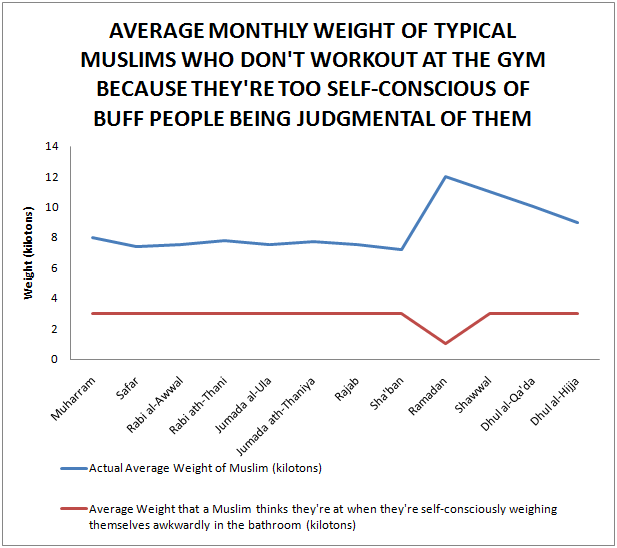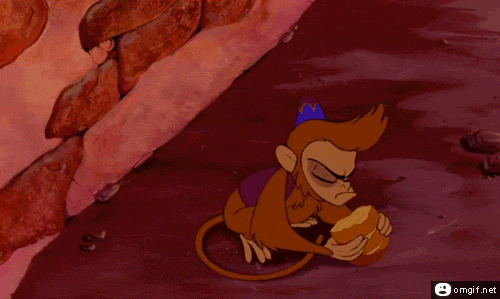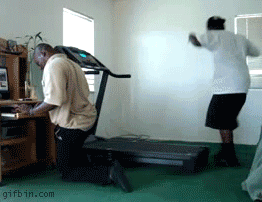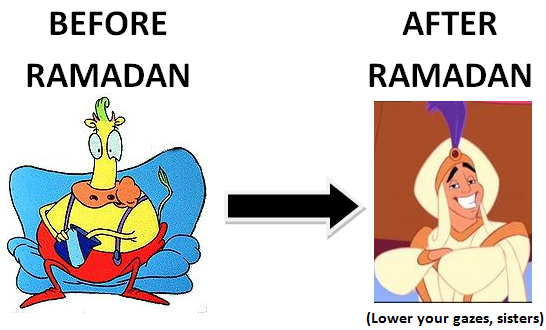
My dear brothers and sisters, Ramadan is finally here! That special time of the year where our divinely-ordained worship blossoms into a beautiful month of passionate devotion, rigorous spiritual purification, profound remembrance, deep self-reflection, unshakable inner tranquility, and selfless compassion.
Ramadan is a truly blessed time that gives us a much-needed opportunity to rediscover the immaculate wisdom of the Qur'an, to rekindle our relationship with our faith, and to edge ourselves closer to He who fashioned us from clay and dirt, and to partake in vitriolic fighting in our communities over sighting the moon while subsequently declaring others who don't follow our sighting as deviant. Ahh, the inspirational beauty of how we Muslims respectfully treat the entry of Ramadan into our lives.
Anyways, one of the things that make Ramadan truly stand out amongst all the other Islamic months is its mandate of ṣawm, or fasting. It's a built-in rigorous daily spiritual weight-loss program that trims the unsightly chunks of fat off of your īmān, and gives you a sizzling hot spiritual form that just might make some of the angels blush (okay, probably not – but wouldn't that feel pretty awesome?).
Think of Ramadan as the intense P90X workout routine for your īmān - in just 30 days your īmān will have abs of steel and pecs so tough that it'll make Shayṭān feel like a fat little chubby kid trying to tempt you when he finally pays his bail and gets let out of jail on probation after 'Īd al-Fiṭr. But that's ONLY if you're willing to go the extra mile and give your īmān that workout that it so desperately needs this month!
Now, spiritual trimming is wonderful and all, but we know why you're really here. Just admit it: you've been letting yourself go this past year, haven't you? Sneaking in guilty pleasures every now and then like whole family-size bags of M&Ms, weekly orders of super-sized fish filet meals at McDonald's, and massive bowls of the heaviest chicken masala curry drowned in buckets of oil and grease. All those fattening foods have taken their toll on your weight since last Ramadan, and now you're probably gearing up for a grand feast every night after ifṭār as a reward for your fasting, huh? Well, shame on you!
Despite the fact that we fast in Ramadan, we like to convince ourselves that we're actually losing weight, but according to clinical obesity research that I myself have completely made up, this is clearly a huge misconception. You might want to ask your kabob roll to leave the room, and tell your Philly cheese-steak to cover its eyes. The information below is not for the weak of heart. Well actually it kind of is, since cardiovascular disease is a side effect of – okay you get the point.

That's right. Kilotons. Does this chart make any sense when you actually think about it? Probably not. But did it make you feel self-conscious? I hope so. We've just been fooling ourselves into thinking that fasting would help trim that stubborn chubby belly fat and get us back on the fast-track to getting married (or if you're already married, getting you back to having your spouse NOT lower their gaze at you out of eye-strain).You're probably thinking: “Well fine, you've made your case that Ramadan isn't exactly the automatic weight-loss dream-month that most Muslims convince themselves that it is. So what's the solution, then? How do I banish my stubborn unsightly fat to the depths of obscurity like Shayṭān gets banished every Ramadan?” Fortunately for you, my friends, MuslimMatters is here to help. This is our 5-step guide to Healthy Ramadan Weight Loss!
1 STOP SPEED-EATING AT SUḤŪR
Yeah, yeah, we've all heard that familiar excuse: it's nearly 3 minutes to fajr, you just woke up and rolled out of bed, and you gotta quickly grab something before time's up and you're left hungry and grumpy. So you rip open the kitchen cabinets and stuff yourself full of as many chips and cookies you can lay your hands on, then down a giant glass of milk at Guinness world-record speeds all before the game timer reaches zero and the referee blows the whistle and begins the adhān. What's worse than that are the folks who have plenty of time before fajr, but somehow are still frantically gorging like there's no tomorrow. You're chewing furiously all to beat the clock, and to anyone looking at you, it just 'aint a pretty sight.

Take it easy there, buddy. Suḥūr isn't an eating contest – it's meant to give you a small energy kick to start your day off, but after you quickly expend that energy, you're on your own for the remainder of the fast. Stuffing yourself with more food doesn't necessarily mean you'll get more energy, so don't fool yourself into thinking a 7-course gourmet suḥūr meal will carry you all the way to ifṭār.
Take it easy, relax, moderate your intake, and eat just enough to give you strength for a small kick in the morning to get you started on your day, and leave it at that. Trust me on this, your body is an amazingly intricate biochemical machine. During a fasting state when your fuel starts to run on empty, your body begins producing hormones which naturally target your fat and energy stores and begin slowly burning them throughout the day to keep you on your feet. Allāh
2 DON'T OBSESS ABOUT FOOD
Let's do a little psychology experiment. I'm going to put a word here, and you tell me the first thing that comes to your mind as soon as you read it. Are you ready?
Chicken.
I'm almost 99% confident I know EXACTLY what you thought about once you read that word. You were thinking about lamb gyros. Don't even try to deny it – you had food on your mind. It's all psychology, and your mind follows that basic impulse just like everyone else's. I'm willing to bet that if I wrote “marriage dinner” as the phrase, the brothers would immediately think about their fantasy future wife's heavenly cooking, and sisters would immediately conjure up warm thoughts of all the romantic candle-light restaurants their future husbands probably won't take them to out of lazy stinginess. The point is, you're too preoccupied with food during Ramadan, and that's got to stop.While fasting, you can't lose yourself in your day-dreams about the magnificent ifṭār feast waiting for you at maghrib time and drooling over the guessing games you play over what kind of delicious dinner awaits you every night. Obsessing over food while you're fasting is unhealthy and creepy, and points to a deeper dependence on food that you need to break.
Turn off the food channel, stop hanging around the kitchen staring at the fridge, and stop talking about food in general. Focus your time and efforts on worship and remembrance, and make every effort you can to expel all subconscious thoughts of food and drinks. It's tough to break dependance on snacks and meals, I know, but in the end, your tummy and your brain will thank you for it once Ramadan is over. Weight loss is just as much a battle of your mind as it is your body. Train both this Ramadan to give yourself the best edge over fighting your fat.
3 EXERCISE (DUH)
Okay yeah, I know what you're thinking. “Exercising to lose weight?! Gee, thanks for the tip, Captain Obvious.” Well you know what, sometimes the most obvious solution is the one most overlooked or brushed off. So you're welcome, Lieutenant Sarcasm. The fact that we're fasting is the single biggest excuse that Muslims always come up with during Ramadan to justify their vegetable lifestyle during this month. Even potatoes get to see more movement than we do during Ramadan since they're skinned, cut up, and cooked almost every night. This is not a month of laziness, so DON'T USE FASTING AS AN EXCUSE FOR YOUR LAZINESS!

Yes, we're in a weakened state with low energy reserves while fasting, so it's understandable that for older folks, exercising might be dangerous. But for you younger able people, I'm not asking you to do Olympic weightlifting but to be active so you can speed up your body's fat burning. Like I mentioned before, in a fasting state, your body starts to mobilize your fat and begins burning it to power you. If you lay around all day and just nap and rest, your body won't need to burn much fat at all to keep you active, so your stubborn belly fat isn't going to magically disappear just because you've stopped eating for part of the day.
If you're young and able-bodied this Ramadan, start building habits of taking the stairs instead of the elevator, lightly walking to places instead of driving for 5 minutes, and opt to help with heavy work around the house instead of napping all day. Starting up a light, simple, and consistently active routine during Ramadan serves as an excellent means of really shaving off that excess weight and shaping you up quite nicely to force a lot of gaze-lowering once 'Īd al-Fiṭr rolls around.
4 STOP FEASTING AT IFṬĀR
Of all the Ramadan enemies that cause your weight-gain, this here is the biggest culprit. We're all guilty of doing this at one point or another during Ramadan – yes, even you, uncle in self-denial with the dried masala stains on your shalwar and the old grains of biryani from 3 Ramadans ago still imprisoned in your beard.
Fasting all day makes even the smallest of ifṭār morsels taste like the most wonderful food in the world, and your appetite at break time is so voracious that you're probably ready to inhale the entire dinner table. That's why we tend to consider ifṭār and the subsequent dinner to be a rewarding entitlement for us that wipes away the guilt of other people seeing us using construction vehicles to pile on mountains of food onto our plates after we break our fasts.

Yup. Your Ramadan seems to be going great.
For the sake of your health and your weight, you need to stop that. The point of ifṭār and the subsequent dinner is to sustain yourself and replenish your strength and energy after a long day's fast. It's not meant for you to consume the entire combined food volume of breakfast, lunch, brunch, afternoon snacks, and dinner all at once in one sitting. What was the entire point of you fasting if you're just going to shamelessly reward yourself at night with a MASSIVE meal fit for Jabba the Hut?
5 BE MINDFUL OF OTHERS
One of the most oft-forgotten aspects of Ramadan is its strong focus on charity and providing means of support for those less fortunate than you. We tend to limit this solely to monetary forms of charity, which detracts focus from an equally important goal for this month: feeding those less fortunate than us. Our money goes a long way, alḥamdulillāh, and it's wonderful that this month opens our hearts and our wallets as well, but it's rare that fasting Muslims reach out to soup kitchens, homeless shelters, and orphanages that are all around us. Not to mention parts of our own ummah which are suffering severely from drought, famine, war, and natural disasters. Giving your money for these causes is excellent, but disingenuous when you're throwing away entire plates and trays of leftover uneaten food every night while other Muslims are clearly starving to death.
Want to know the most sure-fire way of losing weight this Ramadan? Treat each morsel of food that you've been blessed with every night as the most precious commodity you can ask for. Picture that lavish plate of delicious gourmet goodness sitting in the lap of a starving Somalian girl, or in the hands of a grief-stricken refugee mother of a hungry newborn, and I promise you that you'll treat your food with a far deeper level of appreciation than ever before, and you'll certainly think twice before greedily jumping for 2nd, 3rd, and 4th helpings. That crushing guilt becomes even more compounded when you're approaching the garbage can with a half-eaten plate of food with overestimated portions that you yourself slapped on in the hopes that you'd mindlessly devour it.
Ramadan is the month of remembrance, so remember your starving brothers and sisters abroad and make an effort to not just throw money at the problem and feel good about yourself, but also make sincere du'ā' that Allāh

And there you have it, folks! Be sure to follow this guide for the remainder of this blessed month and inshā'Allāh you'll see striking results in no time!

Source: http://www.muslimmatters.org/
No comments:
Post a Comment